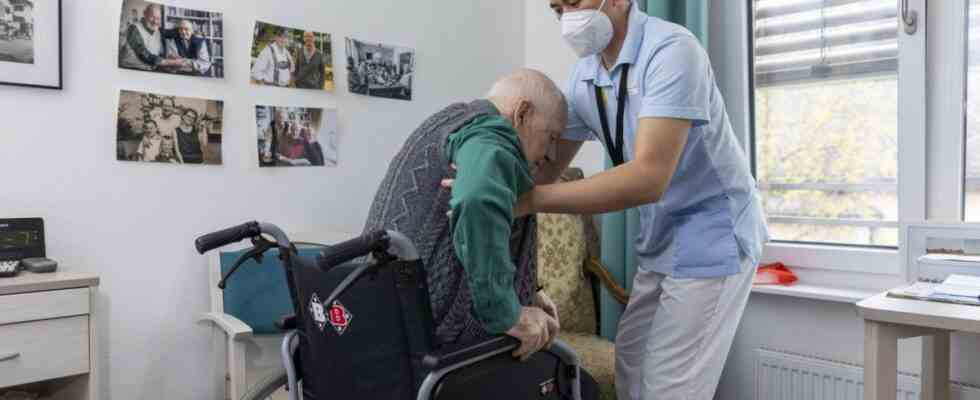More than a third of all senior citizens who live in a Munich nursing home are already dependent on social assistance because their own contribution to the home costs cannot be covered by their pension and their assets have been depleted. Residents with care grade 3, for example, have to pay between 3200 and 3700 euros a month in the first year in a single room in a home.
That even exceeds the theoretically achievable maximum pension by far: Anyone who paid the maximum contribution after the contribution assessment ceiling (currently at 87,600 euros annually) from 1977 to 2022, i.e. for 45 years, which hardly anyone is likely to achieve, would according to calculations by the German pension insurance now receive a monthly pension of 3141.82 euros. After deducting the pensioner’s own contribution to health insurance and long-term care insurance, €2,791.51 remains before taxes. The average old-age pensions paid at the end of 2021 were well below this: 1,212 euros for men in the old federal states, 737 euros for women.
So it is not surprising that the proportion of those who are dependent on social assistance in the nursing home continues to increase year after year. For the end of 2021, the social department puts the proportion at 36.5 percent, 1.8 percentage points more than three years ago. Almost 2,700 nursing home residents need social assistance, which the district of Upper Bavaria takes over if their own income and the benefits of the nursing care fund do not cover the costs. Those affected will then only receive a so-called cash amount each month (2022: 127.17 euros). This is freely available, for example for a visit to the hairdresser, drinks, TV magazines or pedicures.
In the last legislative period, the federal government made a first attempt to limit the own contributions, which have been visibly increasing for some time, reported social officer Dorothee Schiwy (SPD) in the city council’s social committee. However, the relief that has been in force since the beginning of 2022 depends on the duration of the stay in the home. There is a surcharge of five percent in the first year, 25 percent in the second year, 50 percent in the third year and 75 percent from the fourth year – but only for care-related expenses.
A look at the costs for a single room in the Caritas St. Nikolaus old people’s home, which is by no means one of the most expensive homes, shows how this works: The current price list there shows monthly costs of 4779.29 euros for care grade 3. The cost price when moving in (as of November 2022) is EUR 3418.75, after twelve months it is EUR 3024.60, after 24 months EUR 2630.39 and after 36 months EUR 2137.77. In the Evangelisches Pflegezentrum Sendling, you have to pay 3217.47 yourself in a normal single apartment in the first year.
About half of the residents die within the first year
The fact that more residents of nursing homes do not receive social assistance in view of these amounts is probably due to the fact that about half die within the first year in the home, as the “Twelfth Market Report on Nursing” from the social department has shown. In order to pay for only a few months, however, existing savings are probably just sufficient in many cases. Thanks to the Relatives Relief Act that came into force in 2020, parents only have to worry that their children will be required to pay if their gross annual income exceeds 100,000 euros.
Because a large proportion of those in need of care hardly receive any relief when it comes to their own contribution, social officer Dorothee Schiwy has long been calling for a “sustainable limitation of the personal contribution” for all residents in the homes. Corresponding letters went not only to the current Minister of Health, but also to his predecessor. Energy price developments, general inflation and higher personnel costs have already caused the own shares to rise significantly. Experts expect that they could rise by a further 300 to 400 euros a month this year, for example in the case of home owners who pay their staff according to the public sector tariff. At the request of the city council faction The Left/The Party, the social committee has now decided that the mayor will be asked to demand further steps from the federal government to significantly reduce the own shares.
In addition, the solidarity long-term care insurance must be introduced in the medium term, affirmed social officer Schiwy. The chairwoman of the SPD/Volt parliamentary group in the town hall, Anne Hübner, said, “the cost increases make it clear that long-term care insurance needs a major reform, because the necessary increases in income for the staff always have to be passed on to the residents”. The long-term care insurance refinances these cost increases to an ever smaller extent.

